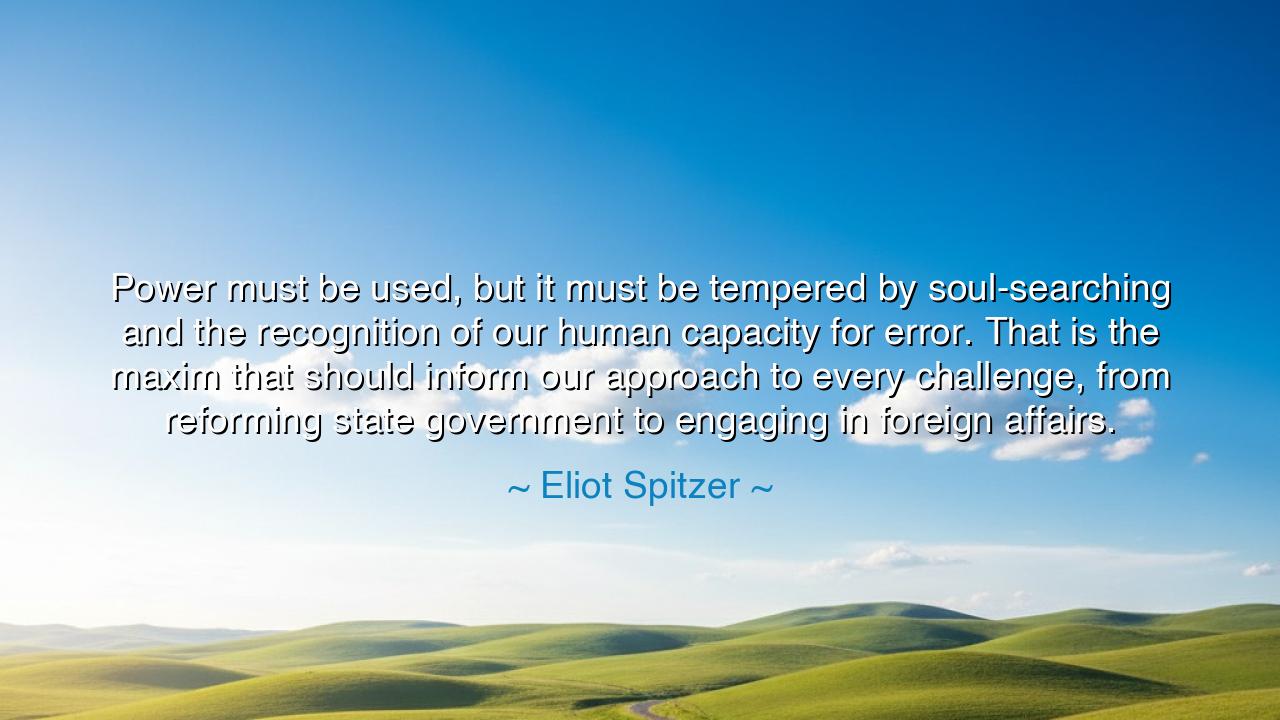
Power must be used, but it must be tempered by soul-searching and
Power must be used, but it must be tempered by soul-searching and the recognition of our human capacity for error. That is the maxim that should inform our approach to every challenge, from reforming state government to engaging in foreign affairs.






The words of Eliot Spitzer—“Power must be used, but it must be tempered by soul-searching and the recognition of our human capacity for error. That is the maxim that should inform our approach to every challenge, from reforming state government to engaging in foreign affairs.”—carry the deep resonance of wisdom earned through experience. In them, one hears the eternal tension that has haunted all who have held authority: the necessity of power and the danger of its abuse. Spitzer speaks as one who knew firsthand both the intoxicating strength and the humbling fragility of power. His message is not merely political—it is moral and universal. It tells us that power, like fire, is a force that can build or destroy depending on the conscience of the hand that wields it.
The origin of this quote comes from Spitzer’s time as a public servant and reformer, when he sought to clean corruption from government and hold powerful institutions accountable. As Attorney General and later as Governor of New York, he often stood as a figure of fierce conviction—determined, relentless, and unyielding. Yet his later downfall and disgrace revealed to him, and to the world, the frailty of all human ambition. This quote, drawn from that understanding, is both a creed and a confession. It is an acknowledgment that power must serve justice, not ego, and that even the most righteous cause can be corrupted when the wielder forgets his own imperfections.
In the style of the ancients, let us see his words as a reflection of an old and sacred truth: that power without reflection becomes tyranny, and reflection without action becomes impotence. The wise ruler, said the philosophers, walks the narrow bridge between strength and humility. For power is not evil in itself—it is the means by which good may be done. But it is also the mirror that reveals a person’s soul. The one who holds power must therefore look inward before acting outward, must ask not “Can I?” but “Should I?” For the greatest danger of power lies not in its enemies, but in the arrogance it breeds within its possessors.
History is filled with the lessons of those who forgot this truth. Consider Napoleon Bonaparte, who rose from the ashes of revolution to crown himself emperor of France. At first, he was guided by the ideals of liberty and reform, but as his victories multiplied, his reflection ceased, and pride devoured prudence. His ambition reached beyond justice into conquest, and in seeking to rule the world, he lost his own soul—and his empire. Yet contrast him with George Washington, who, having commanded the armies of revolution, laid down his sword and refused the crown. Washington understood that restraint is the highest form of power, for to command oneself is greater than to command nations. Spitzer’s maxim calls us to that same understanding: that every act of authority must be governed by the awareness of our human fallibility.
Spitzer’s warning reaches beyond politics and into the soul of every person who wields influence—be it a parent, a leader, a teacher, or a friend. Each of us, in our own sphere, holds power over others: the power to decide, to persuade, to affect lives. If we act without reflection, we risk harming those we mean to help; but if we temper our actions with soul-searching, we transform power into stewardship. It is the difference between control and care, between domination and duty. The ancients would call this the balance between hubris and wisdom—the humility to know that we can be wrong, and the courage to act nonetheless in pursuit of the right.
Even Spitzer’s own story serves as a parable of his words. A man of formidable intellect and determination, he rose to prominence as a crusader against injustice—but fell through his own human weakness. And yet, from the ashes of his fall came a truth that humbles us all: that no one is beyond error, and that those who hold power must therefore exercise it with constant self-examination. Power, when purified by remorse and reflection, becomes wisdom. It is not the absence of mistakes that defines integrity, but the willingness to confront them and learn.
So, my children of the future, take this teaching into your hearts: to wield power rightly, you must first master yourself. Do not fear power, for without it, good cannot prevail. But neither worship it, for it is a treacherous companion. Whether you lead a nation or a household, let every decision be guided by conscience. Ask yourself always: “Does this serve justice, or does it serve me?” Remember that strength without humility corrupts, but humility without strength accomplishes nothing. True greatness lies in the union of both.
For as Eliot Spitzer reminds us, the use of power is not optional—it is the duty of all who live in society. But its use must always be tempered by the recognition of our humanity—our flaws, our limits, our shared imperfection. The hand that rules must tremble with awareness of its own fallibility. Only then can power become not a weapon of pride, but a tool of progress. Govern your world, therefore, with wisdom and mercy, knowing that the greatest authority you will ever hold is over your own soul.






AAdministratorAdministrator
Welcome, honored guests. Please leave a comment, we will respond soon